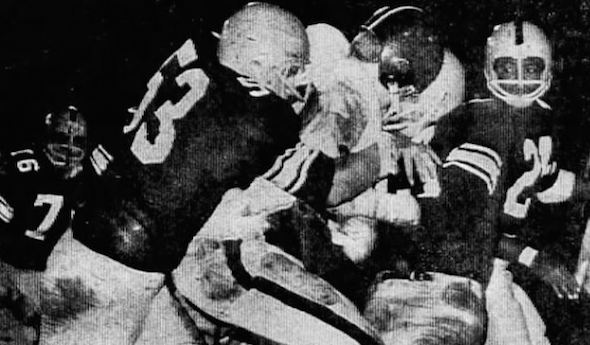
Flashback: Midland Makes '68 Title Play
August 26, 2018
By Ron Pesch
Special for Second Half
It was a sunny, cool late August morning as high school football practice kicked off around the state. The Detroit Tigers were in the midst of a four-game losing streak, their longest to date that World Series-winning season. With 32 games to go, their lead over the Baltimore Orioles was cut to five in the race for the 1968 American League pennant.
Hal Schram, Michigan’s revered prep sports writer, kicked off the start of the season with a trip north. He was on a mission designed to tie up loose ends.
Schram had been covering high school sports in the Great Lakes State since 1941 and began his days at the Detroit Free Press in January of 1945. He had named the 1967 Bay City Central team Michigan’s top Class A squad the previous November. After posting a 9-0-0 season, the school was scheduled to receive a trophy from the newspaper signifying the achievement. However, in mid-November, Detroit’s newspapers began a 267-day strike – the longest in history at the time – that interrupted a planned presentation.
So on Monday, August 25, 16 days after the end of the strike, Schram headed to Bay City. There, he visited with coach Elmer Engel and his staff, then handed off the impressive award before a group of 220 football hopefuls who reported for practice.
 “It should give us added impetus in the weeks ahead,” said the veteran coach, accepting the trophy. This wasn’t a first for Engel and his squads. Entering his 19th year as head coach at Bay City, he had turned the Wolves into a state powerhouse. Back in the days before a postseason tournament, Central had edged unbeaten Battle Creek Central and seven other unbeaten and untied teams in the annual Free Press poll for the 1965 gridiron championship. In 1958, The Associated Press had named his squad the mythical state titlist. His teams had posted 129 wins against only 29 defeats and four ties since his arrival in 1950.
“It should give us added impetus in the weeks ahead,” said the veteran coach, accepting the trophy. This wasn’t a first for Engel and his squads. Entering his 19th year as head coach at Bay City, he had turned the Wolves into a state powerhouse. Back in the days before a postseason tournament, Central had edged unbeaten Battle Creek Central and seven other unbeaten and untied teams in the annual Free Press poll for the 1965 gridiron championship. In 1958, The Associated Press had named his squad the mythical state titlist. His teams had posted 129 wins against only 29 defeats and four ties since his arrival in 1950.
At age 25, Engel had enlisted in the Marines. As a 25-year-old second lieutenant he led his troops “in one of the most desperate, and bloody, battles of World War II – Iwo Jima.” Previously, he had earned three football letters at the University of Illinois and was the team’s MVP in 1942.
In baseball circles, 1968 has been called “The Year of the Pitcher.” On September 14, Detroit’s Denny McLain became the first hurler to win 30 games since Dizzy Dean in 1938. Bob Gibson, star of the St. Louis Cardinals rotation, turned in a 1.12 earned run average, the lowest in the Major Leagues since 1914.
The year 1968 also has been called “The Year that Shattered America.” With the assassination of Dr. Martin Luther King Jr. in April in Memphis, riots broke out in more than 100 cities across the United States. Protests continued to rage across the country over the war in Vietnam. Demonstrations, peaceful and violent, were raised around the world in support of civil rights.
The world was changing; by year’s end, Shirley Chisholm had become the first black woman elected to U.S. Congress. At Yale, moves were made to finally admit female undergraduates. In December, three astronauts aboard Apollo 8 became the first humans to orbit the moon.
High School football season began tragically in Michigan. Only a day before prep season openers, 17-year-old senior Jerry Knight died from a brain injury suffered in a scrimmage. Jerry and his twin brother, Pat, were scheduled to start in the backfield for Grand Rapids Catholic Central. It was reported that this was the first reported football death in the city of Grand Rapids since 1926. In total, 26 football players in middle school or high school across the nation would die that season, a peak that would spur slow changes within the sport.
The reigning Class A champs began the 1968 season at No. 1 in the state’s three prep football polls, published by Schram in the Free Press and the state’s wire services, The Associated Press (AP) and United Press International (UPI) following the second game of the season.
Only days before, the Tigers had clinched the pennant. Three weeks into the high school season, Bay City Central, with victories over a pair of Flint area schools and Saginaw Arthur Hill, remained firmly planted at the top. Battle Creek Central, winner in 32 of its last 33 games, was ranked No. 2, while Detroit Denby, the 1963 Free Press champion, was ranked third.
While the Tigers and St. Louis, the National League pennant winner, were preparing for their World Series opener, Schram was dealing with an overzealous fan as prep teams readied themselves for the fourth week of the season.
“This is the week we make your ratings look sick,” said a long-distance caller from Midland. “I’m telling you we’re going to run down your No. 1 team at Bay City Central. We’ve run three-straight and you’ve never even given us a courtesy call.”
 “The man’s right about one thing,” said Schram in his weekly column highlighting the top contests from around the state. “The Midland-Bay City Central game Friday night certainly rates a top berth among Top Ten Games of the Week. … While Friday’s game with the defending state champions is of primary importance, the Midland team can’t be blamed for taking a quick peak on their TV sets at the World Series. One of their former All-State quarterbacks, Larry Jaster, just might be pitching for St. Louis against the Tigers.”
“The man’s right about one thing,” said Schram in his weekly column highlighting the top contests from around the state. “The Midland-Bay City Central game Friday night certainly rates a top berth among Top Ten Games of the Week. … While Friday’s game with the defending state champions is of primary importance, the Midland team can’t be blamed for taking a quick peak on their TV sets at the World Series. One of their former All-State quarterbacks, Larry Jaster, just might be pitching for St. Louis against the Tigers.”
No doubt to the joy of the caller, Midland ruined Bay City’s homecoming with a 12-7 win before a crowd of 7,000. With the loss, the Wolves fell to seventh in Schram’s rankings while Midland’s Chemics made their first appearance, entering the Free Press list at No. 4. With Bay City’s loss, Battle Creek Central, the 1966 Class A champ, moved to the top spot across the state’s three polls.
Just a year before, Battle Creek had been in the same position. Like Bay City, the Bearcats had followed their 1966 title by opening the next season ranked No. 1. Riding a 27-game win streak dating back to November of 1964, Battle Creek saw the run end in the eighth week of the 1967 season when 6-A Conference rival Kalamazoo Central nipped the Bearcats, 7-6, on a rainy, windy night at Kalamazoo College’s Angel Field.
“We’re not a holler team,” Battle Creek Central coach Jack Finn said to the Free Press sports editor, Joe Falls, prior to that Kalamazoo game. “We try to keep our kids at an even keel. No, we try to keep the emotion out of it.”
Following the contest, “Finn was pacing the room like a grizzly bear,” wrote Falls.
“‘That’s part of growing up’ he said.
“’Look at these kids – they never lost before. They don’t know how to take it.’”
“Finn consoled one player, then walked back across the room. ‘A test for the kids?’ he said, finally managing a weak smile. ‘This is a test for me. The last time we lost I woke up in the morning and vowed I’d never coach again.’”
Both Finn and Falls knew that defeat was an integral part of kids growing up.
But with Battle Creek’s loss, Bay City moved to the top spot. A week later, the Wolves picked up their ninth win, and with it, the 1967 mythical state crown.
 Finn’s 1968 Bearcats had started the season slowly, downing Benton Harbor 14-0 in the season opener and then surviving an early-season scare on the road with Ann Arbor Huron, 6-0, before knocking off conference foe Lansing Eastern in the season’s third week, 27-6. Grinding out 455 yards on the ground, the Bearcats mauled East Lansing, 41-0, in Week 4.
Finn’s 1968 Bearcats had started the season slowly, downing Benton Harbor 14-0 in the season opener and then surviving an early-season scare on the road with Ann Arbor Huron, 6-0, before knocking off conference foe Lansing Eastern in the season’s third week, 27-6. Grinding out 455 yards on the ground, the Bearcats mauled East Lansing, 41-0, in Week 4.
“We were a very balanced team with lots of very good players, but no great ones,” recalled Terry Newton, a first team all-state choice at center in 1968. “We were kind of unheralded with a very tough defense.”
“This is perhaps the best balance squad (Coach) Finn has ever led into a season,” wrote Schram at the time, announcing the change at the top of his Class A poll. “Against East Lansing, Battle Creek used eight running backs almost of equal stature. John Simms, a junior who doesn’t even start, has rushed for 233 yards in 21 carries in his last two games. He’s one of southern Michigan’s foremost breakaway runners.”
On Thursday, October 10, the Detroit Tigers clinched Game 7, 4-1, to win the World Series. The following evening beneath the lights of Memorial Stadium, the Bearcats had their hands full in a game played in Lansing.
“For at least one night, Sexton was the equal of Michigan’s No. 1 prep football team, Battle Creek Central,” wrote Dave Matthews in the Lansing State Journal. “It didn’t work out quite that way on the scoreboard, Battle Creek rallying for a 14-13 decision … but the final tally could not erase a stirring upset attempt by the Big Reds.”
 Late in the contest, Battle Creek took advantage of an injury to Lansing Sexton’s all-city tackle, Tom Bush. According to the Journal, the Bearcats pounded the left side on nine out of 10 plays, driving 65 yards, with Simms scoring from two yards out with 2:01 remaining in the contest to knot the score. Ernest English kicked the extra point to give Battle Creek its first lead of the game. Prior to Bush’s departure, the Bearcats had been held to a single first down in the second half.
Late in the contest, Battle Creek took advantage of an injury to Lansing Sexton’s all-city tackle, Tom Bush. According to the Journal, the Bearcats pounded the left side on nine out of 10 plays, driving 65 yards, with Simms scoring from two yards out with 2:01 remaining in the contest to knot the score. Ernest English kicked the extra point to give Battle Creek its first lead of the game. Prior to Bush’s departure, the Bearcats had been held to a single first down in the second half.
Midland, with a convincing 48-6 triumph over Saginaw Arthur Hill, was now entrenched at No. 2 and nipping at the heels of the Bearcats in the Associated Press and United Press polls. The AP rankings were based on a “10 points for first, nine for second, eight for third, and so on” voting system by state sportswriters and sportscasters. The UPI rankings were compiled based on the votes of a panel of 17 football coaches from across the state. Schram still ranked Midland at No. 4, trailing Battle Creek, but noted that the Chemics and their coach Bob Stoppert had an outside chance at their second state title in 11 years.
“That would be nice, but we’re not ready to debate such matters,” the 51-year old Stoppert said to Schram as teams headed to Week 6 of the season. “I’m too old to be impressed by the polls. I know the fans and the kids like them, but they’re a nuisance as far as a coach is concerned. If you fellows would wait until the end of the season to rate your teams, I wouldn’t have any objections. But I know you’re not going to listen to that.”
No changes occurred that week, as the Bearcats trounced 6-A conference foe, Jackson, 56-0 and Midland rolled over Saginaw Valley Conference opponent Alpena, 38-0. A loss by Grand Rapids Union boosted the Chemics to third in Schram’s rankings.
Battle Creek squared off against Ann Arbor Pioneer, ranked No.5 in the polls by both AP and UPI in Week 7.
With Battle Creek trailing the Pioneers 7-0 at the half, Jim Roebuck nailed a 34-yard field goal in the third quarter to make it 7-3. A huge goal-line stand late in the fourth quarter by Pioneer appeared to seal an upset, but three successive stops by the Bearcats’ defense prevented Ann Arbor from running out the clock. Following the punt, Battle Creek took over on the Pioneers’ 42 with 2:30 to play. A touchdown by Simms with 1:18 left gave the Bearcats a 9-7 victory.
United Press voters were impressed with the comeback and kept Battle Creek at No. 1, rewarding the Bearcats with a widening point gap between first and second place in their poll. Midland had downed league opponent Flint Northern, 28-12, and, in the eyes of AP voters, the Bearcats and Chemics were now tied for No. 1 as the season headed for the finish line.
 “In those days, the Saginaw Valley was considered perhaps the toughest conference in the state,” said Peter Aseritis, who captained the Chemics in 1968. “Back then, eight of our nine games were against conference opponents.”
“In those days, the Saginaw Valley was considered perhaps the toughest conference in the state,” said Peter Aseritis, who captained the Chemics in 1968. “Back then, eight of our nine games were against conference opponents.”
The Bearcats avenged the previous year’s loss to Kalamazoo Central, 31-7, while Midland downed Bay City Handy 27-7 in Week 8. While the Free Press and UPI kept Battle Creek on top, AP voters pushed the Chemics to No. 1 in their list by a single poll point.
Prior to season’s end, Schram set the stage for football fans across the state.
“While close to 7,000 fans are expected at Post Field for this (week’s) intra-city showdown (between Battle Creek Central and Battle Creek Lakeview), Midland goes after its first perfect season since 1957 at Saginaw where another crowd of 6,000-plus is anticipated. At stake will be the Saginaw Valley League title. Midland holds the No. 3 rating in the state and Saginaw is ranked No. 4.”
“This is the greatest gang of seniors we ever have had at Central … they never gave up … yes, I definitely feel that we are No. 1 in the state,” said Coach Finn to Bill Frank of the Battle Creek Enquirer “as he came dripping out of the shower, clothes and all” following Central’s 19-7 win over Lakeview. It was the third perfect season for the Bearcats in four years, and only the fourth perfect campaign in school history.
Midland defeated Saginaw 20-13.
“There was some violence after the game,” noted Aseritis. “Some fans were upset. Rocks were thrown at our bus; some windows were broken.”
Both the Detroit Free Press and the United Press International season-ending polls named Battle Creek at No. 1. The Associated Press saw it differently, awarding Class A’s mythical crown to Midland while placing the Bearcats tied for third with Ferndale. Unbeaten in eight games, Detroit Denby finished second in the AP rankings, compiling 131 poll points to Midland’s 135. Midland received seven first place votes to three for Denby. Battle Creek ended with 129 points and five first-place votes.
Without the structure of a playoff system, there was no chance that the two top-ranked teams would meet on the gridiron.
 “There is a certain level of charm to the time of mythical state titles. Winning a conference championship was much more important back before the arrival of the playoffs and today’s focus on six wins,” said Newton, who went on become athletic director at Battle Creek St. Philip, a member of the Battle Creek Parks and Recreation department and the radio voice of prep sports in Battle Creek as host of ‘Coach’s Corner’ on WBCK for more than 25 years.
“There is a certain level of charm to the time of mythical state titles. Winning a conference championship was much more important back before the arrival of the playoffs and today’s focus on six wins,” said Newton, who went on become athletic director at Battle Creek St. Philip, a member of the Battle Creek Parks and Recreation department and the radio voice of prep sports in Battle Creek as host of ‘Coach’s Corner’ on WBCK for more than 25 years.
“It was a great time at Battle Creek Central. We had a lot of winning tradition,” continued Newton. “For five or six years, Bay City and Battle Creek dominated (Class A) football. I think that some voters fell in love with Midland that year, and that split the vote. But we were the champs according to Hal Schram. That was the big one. He really was the state’s top prep sportswriter.”
“On the weekend of October 12th and 13th back in Midland, the team will reunite to celebrate the 50th anniversary of their title. On Friday, the school plans to honor us during the game,” said Aseritis, who also earned first team all-state honors in 1968. “I won’t make it back for that. My son is a senior at Elk Rapids. He has a game and I plan to be there, but I expect to be in Midland on Saturday for our reunion. As players we got a piece of it.
“Back then, it was ground and pound; a real physical game. Today, the game is wide open and space. Of course, back then we only had to play nine games. You got to hand it to those who get to the state title game today. Now, kids have to play 14.
“We had it easy,” he added, laughing.
Fifty years down the road for both men, the camaraderie and chance to learn to work with others toward a common goal still stand out from those days.
“Yes, I recall certain days from my career,” added Aseritis, a former Marine Corps captain who traveled the world as a financial analyst and consultant. “My times playing high school football, college football and my years in the military are the days that mean the most. Those are lifetime memories.”
“Within the football program, the issues of the times never really came up,” said Newton reflecting on his days at Battle Creek Central. “The coaches never talked about it. They were focused on blocking and tackling. The players were focused on school and football. Our team came together from four different junior high schools at Central; it was a mixed community, maybe 50 percent black and 50 white.
“We had to come from behind a few times that season. That’s where you learn to work with other people; how to handle adversity and success, and deal with challenges. We had great camaraderie, and that allowed us to have the success we had.”
After stints at Dansville, Hudson and Coldwater high schools, Finn held the football reigns at Battle Creek Central for 11 years. He stepped aside following the 1968 season to take on the dual role of athletic director and head football coach at Northwood Institute in Midland. At Northwood, he helped found the Great Lakes Intercollegiate Athletic Conference. He retired as the school’s football coach following the 1986 season and as AD in 1989. He died in 2013.
Elmer Engel and his Bay City squad again would grab the Class A title in 1969 and in 1972. He retired after the 1972 season with a 165-34-8 record and five mythical state titles. In 1973, the school chose to rechristen its football stadium in his honor in recognition of his incredible success. The classic concrete structure was built in 1925. Engel died in 2006 at age 86.
Stoppert stepped aside following the 1974 season. A Flint Northern graduate, he had coached briefly at Flint Bendle and Rockford before being named head football coach at Midland in 1953. The Chemics posted 128 victories, 58 losses, six ties and two mythical gridiron championships during that span. He died in 2003.
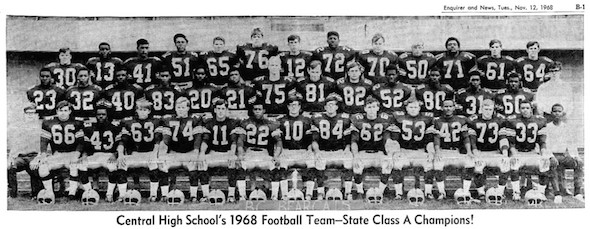
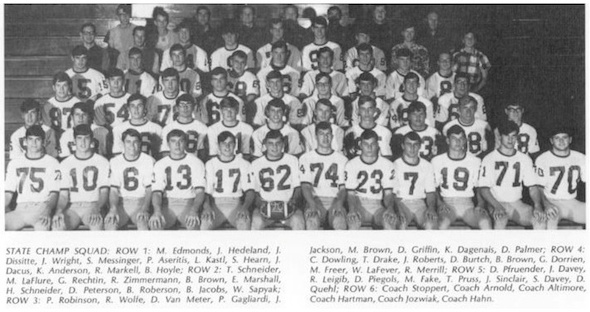
 Ron Pesch has taken an active role in researching the history of MHSAA events since 1985 and began writing for MHSAA Finals programs in 1986, adding additional features and "flashbacks" in 1992. He inherited the title of MHSAA historian from the late Dick Kishpaugh following the 1993-94 school year, and resides in Muskegon. Contact him at [email protected] with ideas for historical articles.
Ron Pesch has taken an active role in researching the history of MHSAA events since 1985 and began writing for MHSAA Finals programs in 1986, adding additional features and "flashbacks" in 1992. He inherited the title of MHSAA historian from the late Dick Kishpaugh following the 1993-94 school year, and resides in Muskegon. Contact him at [email protected] with ideas for historical articles.
PHOTOS: (Top) Battle Creek Central’s Terry Newton (53) and Jim Roebuck tackle Battle Creek Lakeview’s Dave Roberts during their 1968 game. (2) Hal Schram presents Bay City Central with the 1967 Detroit Free Press Class A championship trophy. (3) Bay City Central coach Elmer Engel and a player during the 1967 season. (4) Battle Creek Central coach Jack Finn. (5) Battle Creek Central’s Terry Newton. (6) Midland coach Bob Stoppert. (7) Midland’s Pete Aseritis. (8) Battle Creek Central’s 1968 championship team. (9) Midland’s 1968 championship team. (Photos gathered by Ron Pesch.)
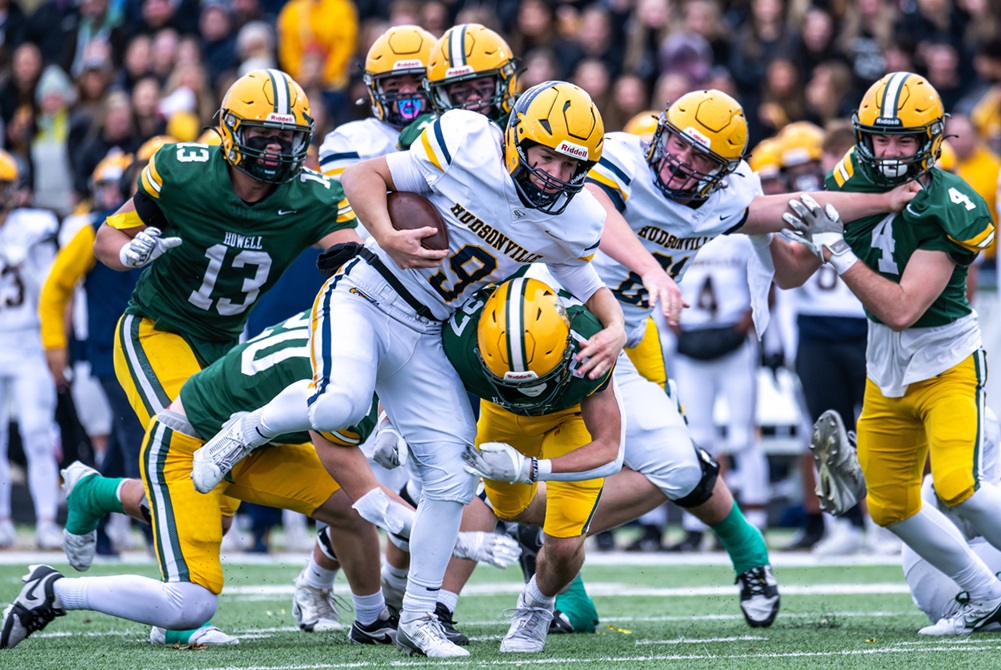
1st & Goal: 2024 Playoffs Week 3 Review
By
Geoff Kimmerly
MHSAA.com senior editor
November 18, 2024
We’ve rounded the final turn toward the finish of this 2024 football season.
 All four 8-player finalists are decided, and we lead off today’s “Review” with a look back and how they earned their trips this weekend to Northern Michigan University’s Superior Dome.
All four 8-player finalists are decided, and we lead off today’s “Review” with a look back and how they earned their trips this weekend to Northern Michigan University’s Superior Dome.
We also glanced at all 32 Regional Finals in the 11-player bracket as those winners pulled within one more victory of booking Thanksgiving weekend at Ford Field.
8-Player Division 1
HEADLINER Pickford 34, Indian River Inland Lakes 18 This proved to be Pickford’s closest game so far this season, but the Panthers (12-0) advanced to their first MHSAA Final since 2019 when they won Division 1 – and also avenged a 12-0 Semifinal loss to Inland Lakes from a year ago. Pickford did so by holding the Bulldogs (11-1) well below its average of 53 points per game heading into the weekend. Click for more from WLUC.
HEADLINER Deckerville 49, Mendon 32 Mendon scored first and trailed by only three at halftime, but Deckerville outscored the Hornets 20-6 over the final two quarters. The Eagles (12-0) slowed down a Mendon rushing attack that hadn’t run into too many obstacles this season, and Deckerville quarterback Hunter Garza ran for 228 yards and three touchdowns and threw for two fourth-quarter scores. Click for more from the Huron Daily Tribune.
8-Player Division 2
HEADLINER Crystal Falls Forest Park 49, Onekama 24 The Trojans are headed back to the Finals for the first time since winning Division 2 in 2017. Forest Park put up more points than Onekama had given up in a game this season and held the Portagers (10-2) to eight fewer than their season average. Click for more from the Iron Mountain Daily News.
HEADLINER Morrice 36, Britton Deerfield 0 Morrice (11-1) dominated on both sides of the ball and with Wyatt Cartier finding the end zone from his positions on offense and defense, running for three scores and returning an interception for a fourth. The Patriots (10-2) were averaging 53 points per game entering the weekend. Click for more from the Lansing Herald.
11-Player Division 1
HEADLINER Detroit Catholic Central 35, Belleville 21 As anticipated, and evidenced by the sizable crowd filling the stands, this was a game many had hoped to see for some time – and they watched DCC (12-0) win its first Regional title since 2017 while ending the career of one of the most accomplished players in MHSAA football history. Belleville (10-2) finished a combined 50-4 with three trips to Ford Field and two Division 1 titles during quarterback Bryce Underwood’s four seasons on varsity. Click for more from the Oakland Press.
Big Performance from Samson Gash! 🚨💥
Check out the highlights of Detroit Catholic Central junior Samson Gash in their win over Belleville in the 2024 Division 1 Regional Final. Gash scored two touchdowns (1 rushing and 1 rushing) and he also made an interception on the… pic.twitter.com/GP622NSDYR
— STATE CHAMPS! Michigan (@statechampsmich) November 17, 2024
Regional Roundup Hudsonville 35 Howell 6 The Eagles (11-1) won their first Regional title since 2005 and ended Howell’s winningest season at 11-1, holding the Highlanders scoreless until the fourth quarter. Rochester Adams 21, Grand Blanc 14 Adams (10-2) improved to a combined 9-3 in the playoffs over the last four seasons by winning its first Regional title since 2021. Grand Blanc finished 9-3, its defeats by a combined 10 points. Detroit Cass Tech 21, Macomb Dakota 14 Alex Graham snagged the game-winning touchdown pass above two defenders with 19 seconds to play to lead Cass Tech (10-2) to its second Regional title in three seasons. Dakota finished 10-2.
11-Player Division 2
HEADLINER Birmingham Groves 21, Warren De La Salle Collegiate 19 Groves (12-0) took a seven-point lead into halftime and a one-point advantage into the fourth quarter on the way to claiming its second Regional title in three seasons. The Falcons’ victory also meant the end of De La Salle’s four-year streak of reaching Ford Field; the Pilots (8-3) were Division 2 runners-up a year ago. Click for more from the Detroit Free Press.
Regional Roundup Byron Center 52, Portage Central 14 Byron Center (11-1) won its first Regional championship and set a program record for wins, taking the next step after falling in a Regional Final last year. Portage Central finished 8-4 after winning its first District title since 2021. East Lansing 49, Saginaw Heritage 27 East Lansing (9-3) repeated as a Regional champion by scoring more points than Heritage (8-4) had given up in a game since Week 3 of the 2023 season. Orchard Lake St. Mary’s 27, Gibraltar Carlson 3 St. Mary’s (9-3) won its first Regional title since 2016, thanks in part to holding the Marauders (10-2) to 39 points below their average and single digits for the first time since 2022.
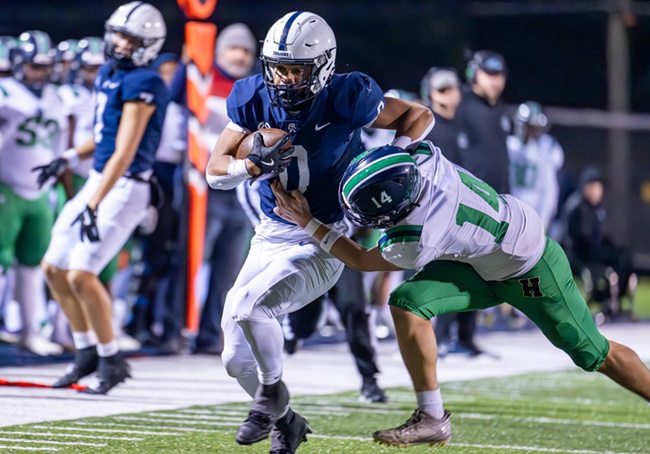
11-Player Division 3
HEADLINER Zeeland West 36, Grand Rapids Forest Hills Central 20 West (11-1) repeated as a Regional winner and this time ended the season for the reigning Division 3 champion, after having lost to FHC 18-14 in the Semifinal a year ago that sent the Rangers to Ford Field. The Dux also had won their regular-season meeting in Week 6, as FHC finished this fall 9-3. Click for more from the Grand Rapids Press.
Regional Roundup Mason 22, Walled Lake Western 17 After falling to Western 20-17 in Week 8, Mason (10-2) avenged to clinch its fourth-straight Regional title and end the Warriors season at 11-1. DeWitt 70, Petoskey 34 DeWitt (12-0) ended Petoskey’s longest playoff run since 2014 by tying its highest-scoring output this fall – and moving into a tie for eighth all-time for single-season scoring by an 11-player team, with 682 points. The Northmen finished 11-1. Detroit Martin Luther King 34, River Rouge 0 King (9-3) ran its Regional title streak to four with a fourth-straight season defeating Rouge during the playoffs since falling to the Panthers (6-5) in a 2020 Regional Final.
11-Player Division 4
HEADLINER Niles 37, Portland 34 Niles (11-1) not only avenged last season’s 21-14 loss to Portland in this round, but in doing so won its first Regional title and set a program record for wins for the second-straight season. Portland is a combined 43-7 over the last four after completing its fourth-straight double-digit finish at 11-1 as well. Click for more from the Niles Daily Star.
Niles vs. Portland.
Regional Championship rematch from 2023.
The Vikings get their revenge!
Niles beats Portland, 37-34, to be a regional champion for the first time ever! 🏆@NilesAthletics @scot_shawNHSfb @BennettTalen @SamRucker14 @Peyton642126111 @brendenolsen22 pic.twitter.com/33dOjkFS96
— Bennett Wise WSBT (@BennettWiseWSBT) November 16, 2024
Regional Roundup Grand Rapids South Christian 28, Whitehall 21 In another one-score Regional Final, Whitehall (8-4) came back to get within striking distance but fell to the Sailors in a Regional Final by this score for the second time in three seasons. South Christian (8-4) needs one more win to reach Ford Field for a third-straight year. Goodrich 42, Haslett 13 Goodrich (11-1) repeated in winning this Regional Final matchup from a year ago as well, controlling the line to run for five touchdowns and adding a sixth on a turnover. Haslett finished 8-4 after beginning 1-3, and with three losses this season to teams playing in Semifinals. Harper Woods 48, Macomb Lutheran North 3 The reigning champion is one win from returning to Ford Field, as Harper Woods (9-3) held Lutheran North to 30 points fewer than its season average. The Mustangs set a program record for wins in finishing 10-2.
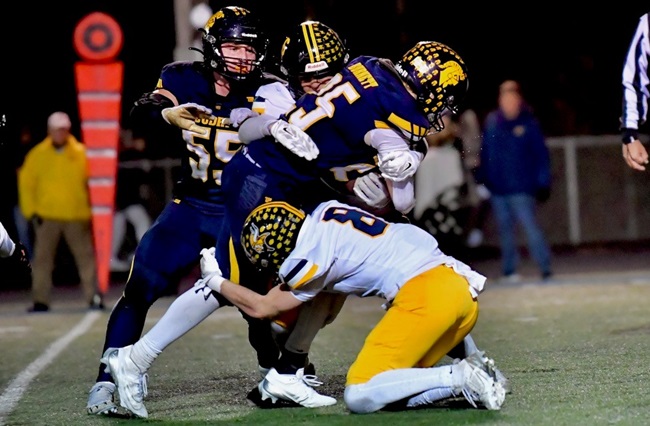
11-Player Division 5
HEADLINER Grand Rapids Catholic Central 21, Kalamazoo United 14 Dale Gant’s touchdown with 3:04 to play was the decider as Catholic Central (8-4) claimed a ninth-straight Regional title. United finished 9-3, with its highest win total since 2018 and two of those losses to opponents still playing. Click for more from Michigan Sports Radio.
Highlights of Grand Rapids Catholic Central's win over Kalamazoo United in the Division 5 Regional Final on November 15th, 2024
🎥 WOOD-TV | @MHSAA @GRCC_CougarsFB pic.twitter.com/Ciwm9QoviW
— STATE CHAMPS! Michigan (@statechampsmich) November 17, 2024
Regional Roundup Frankenmuth 35, Gladwin 0 The Eagles (12-0) added a second win over Gladwin (8-4) over the last four weeks to clinch a fifth-straight Regional championship. Pontiac Notre Dame Prep 45, Armada 19 In winning their first Regional title, the Fighting Irish (10-1) tied their school record for wins. Armada (10-2) also set a school record for wins this fall. Flat Rock 41, Ann Arbor Father Gabriel Richard 0 Flat Rock won a second-straight Regional title with its second shutout this season. FGR finished 7-5 after winning its first District title since 2012.
11-Player Division 6
HEADLINER Lansing Catholic 49, Newaygo 36 Lansing Catholic (9-3) is another team that has entered the spotlight these playoffs, with three wins over opponents that entered those matchups a combined 26-4. The Cougars took advantage of turnovers to get a quick jump this time and followed quarterback Alex Fernandez to their second Regional title in four seasons. Newaygo finished its winningest since 2012 at 9-3. Click for more from MLIVE.
Regional Roundup Boyne City 34, Reed City 21 Boyne City (10-2) rushed to its first Regional title since 2014 on the legs of Owen Hewitt, who scored four touchdowns. Reed City finished 9-3, reaching nine wins for the fifth-straight season. Jackson Lumen Christi 42, Constantine 6 Last season’s Division 7 champion is enjoying similar success in Division 6 as Lumen Christi (11-1) is seeking to make the Ford Field trip for the third-straight year. Constantine finished 8-4. Marine City 52, Detroit Central 26 Marine City (10-2) downed Central for the second time in four weeks after previously defeating the Trailblazers (8-4) in Week 9, 37-15. The Regional title was the Mariners’ second in four seasons.
11-Player Division 7
HEADLINER North Muskegon 23, Menominee 0 North Muskegon made the long drive to the western Upper Peninsula, which allowed additional time to celebrate one of the most notable wins in recent program history. The Norsemen (11-1) claimed their second-straight Regional title and avenged last year’s Semifinal loss to Menominee (10-2), which ended up finishing Division 7 runner-up. This time, North Muskegon shut down a Maroons offense that was averaging 45.5 points per game and put 32 on the Norsemen last season. Click for more from the Muskegon Chronicle.
Regional Roundup Millington 28, Pewamo-Westphalia Defense also was the story in this matchup, as the Cardinals (12-0) posted their fifth shutout this fall, holding the Pirates (9-3) without a point for the first time since 2012. Schoolcraft 28, Hudson 16 Schoolcraft (11-1) will play in the Semifinals for the first time since 2020 after taking the lead during the closing minute of the first half and holding off the Tigers (10-2) the rest of the way. Hudson entered the game giving up only 8.4 points per game and hadn’t allowed more than 17. Monroe St. Mary Catholic Central 55, Leslie 18 St. Mary (12-0) won its first Regional title since 2019 as it continued to surge offensively – the Falcons topped 50 points for the second time this season and also second week in a row. Leslie finished its first winning season since 2012 at 10-2, totaling one more win than the last three seasons combined.
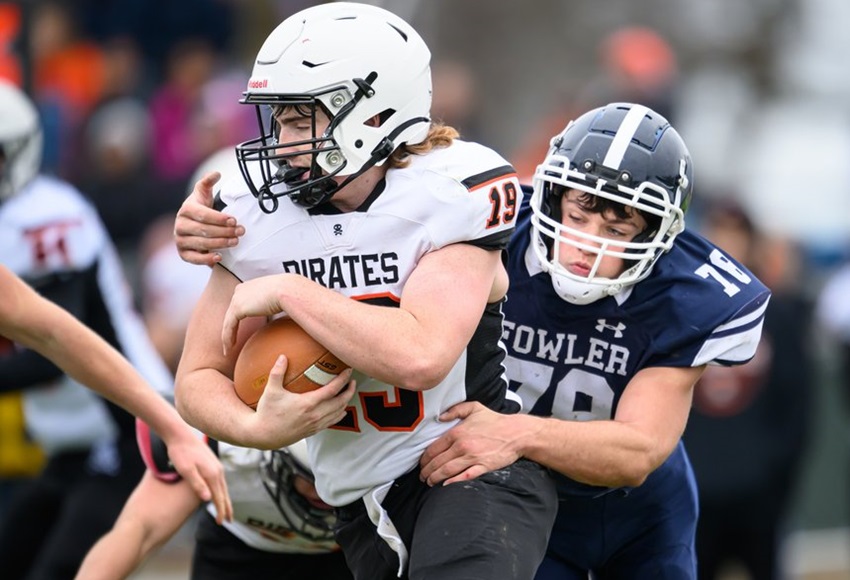
11-Player Division 8
HEADLINER Fowler 25, Harbor Beach 7 Fowler (12-0) has impressed all season and now will play in a Semifinal for the first time since 2019. But this might have been the Eagles’ best win so far this fall. Fowler held a Pirates offense averaging 44 points per game to a single score and put 25 points on a defense that was giving up just 5.5 ppg entering the weekend. Harbor Beach finished 11-1, its best since 2018. Click for more from the Lansing State Journal.
Regional Roundup Beal City 14, Iron Mountain 7 Beal City (10-2) also handed the lone loss of this season to its opponent, traveling to Iron Mountain to win its second-straight Regional title and third in four seasons. The Aggies also defeated the Mountaineers (11-1) in a 2023 Regional Final. Decatur 41, Reading 0 Decatur (11-1) claimed its first Regional title since 2002, continuing a tremendous improvement from 4-5 a year ago. The Raiders have given up only 13 points over three playoff games. Reading finished 7-5, also a considerable turnaround from 2-7 last fall. Riverview Gabriel Richard 30, Detroit Loyola 12 RGR (10-1) was another repeat Regional champion, and this time set a program record for wins in adding a second this fall over Loyola (5-7). The Pioneers also had defeated Loyola 29-8 in Week 5.
MHSAA.com's weekly “1st & Goal” previews and reviews are powered by MI Student Aid, a division within the Department of Lifelong Education, Advancement, and Potential (MiLEAP). MI Student Aid encourages students to pursue postsecondary education by providing access to student financial resources and information. MI Student Aid administers the state’s scholarship and grant programs that help make college Accessible, Affordable and Attainable for you. Click to connect with MI Student Aid and find more information on Facebook and Twitter @mistudentaid.
PHOTOS (Top) Hudsonville’s Bryce Fox (9) emerges from the grasp of multiple Howell defenders Saturday. (2) East Lansing’s Jace Clarizio (0) works to break the tackle of Saginaw Heritage’s Anthony Fries. (3) Goodrich’s Chase Burnett (25) takes on a pair of Haslett defenders. (4) Fowler’s Joe Epkey (78) wraps up a Harbor Beach ball carrier Saturday. (Top and East Lansing/Heritage photos by L.C. Arreguin/Team Arreguin Photos. Goodrich/Haslett photo by Terry Lyons. Fowler/Harbor Beach photo by Kolleth Photo.)

